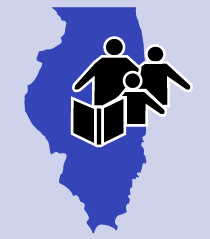
Coaching: An Essential Part of Early Intervention
By Meg Bracco Liebreich, PT
Infants and toddlers learn best by joining in everyday activities with the ones who love and care for them. That includes you, your child’s siblings, and other family members and caregivers. In early intervention (EI), your team also includes the providers who work with you to support you in making an impact in your child’s development.
These providers act as coaches, meaning your providers work with you to help you best support your child in building their current skills and creating new ones. Coaching in early intervention is a way to provide family-centered care that actively involves YOU!
We know that you are the expert on your child and your family. Your EI providers will use their expertise in child development to act as your coach, to sit on the “sidelines” to help you discover new ways to support your little one as they grow, learn, and develop to reach the goals you set together when developing your Individualized Family Service Plan.
Coaching starts with exploring what you want for your child and family (your priorities), the ideas you have, and the strategies you may have tried already. Together, you and your EI provider will come up with ideas, and your provider will guide you forward.
Early intervention focuses on the interactions between you (and other caregivers) and your child during and between sessions—during all the wonderful interactions and activities that happen throughout the day. (We know that it’s the family who provides the “real” EI by creatively adapting your caregiving methods to facilitate your child’s development while balancing all the needs of the rest of the family.)
Sometimes, coaching is simply a watchful eye or a listening ear, observing as you and your child play and providing feedback and support. Other times, your coach may ask questions to help you dig deep and discover new ways to support your child’s development.
For example, your physical therapist may help you find a new way of positioning your little one so they can sit upright to play on the floor or to crawl while chasing their siblings. Your speech therapist may coach you on waiting for your toddler to look or point at the bucket for more blocks before you hand them one, and then gradually progress to using signs or sounds to ask for blocks.
Your occupational or developmental therapist may observe meal or bath time to help find ways to make these routines go more smoothly.
Coaching will look different depending on your family’s priorities, your strengths, and your areas of concerns or challenges at any given time. You and your provider will come up with a plan together depending on what you may need at that particular moment.
Coaching is an important part of your family’s early intervention journey. Parents and providers work together to identify what is going well, what areas may be challenging, and how to best support your ability to promote your child’s development to facilitate their participation in your family and community’s activities.
While no one knows all the answers all the time, together we can share our knowledge and information, problem solve, and develop a plan to best support your family!
Meg Bracco Liebreich is a physical therapist in the early intervention system.
Early Choices Launches New Education Series on Inclusion
Early CHOICES (www.eclre.org) is an inclusion initiative of the Illinois State Board of Education. It promotes increasing high-quality inclusive early care and education for each and every child birth to age 5. Its goal is to increase the number of children with disabilities receiving specialized services in regular early care and education settings.
Early CHOICES is excited to offer “Inclusive Education Series for Families,” a free series of six webinars being held through April 2022.
For more about the series, visit https://go.illinois.edu/choices
The series includes topics that explore key ideas about inclusion for caregivers of children birth through age 5. Topics range from defining inclusion to understanding the benefits of inclusion.
Early CHOICES has recently ramped up its social media efforts. Thanks to the federal preschool development grant, Early CHOICES has been able to expand its reach from birth to age 5 across parental and educational systems.
Throughout the COVID-19 pandemic, Early CHOICES has been focusing on making sure families, childcare agencies, schools, and communities come together inclusively to build systems so children with disabilities are included in each and every aspect of their day.
We invite you to join with Early CHOICES. It has launched a social media campaign (#IllinoisIncludes) to support inclusion and change mindsets so that others are united locally, nationally, and globally to promote inclusion and inclusive opportunities for children with disabilities and their families.
State Systemic Improvement Plan (SSIP) Update
We recently received feedback on the report we submitted to the Office of Special Education Programs in April. Strengths noted include a rapid transition to live video visits, support from local leadership teams, improved data quality, continued progress toward goals, and meaningful stakeholder engagement. Areas needing more information were also noted.
Our next step is to bring stakeholders together to discuss our progress and plans for expanding these efforts beyond our three pilot areas. In the meantime, leadership teams continue to support providers’ use of coaching and engagement practices.
Related Resource(s)
- Tip Sheets: The Family’s Role in Early Intervention Visits
- Resource Guides: Inclusion

